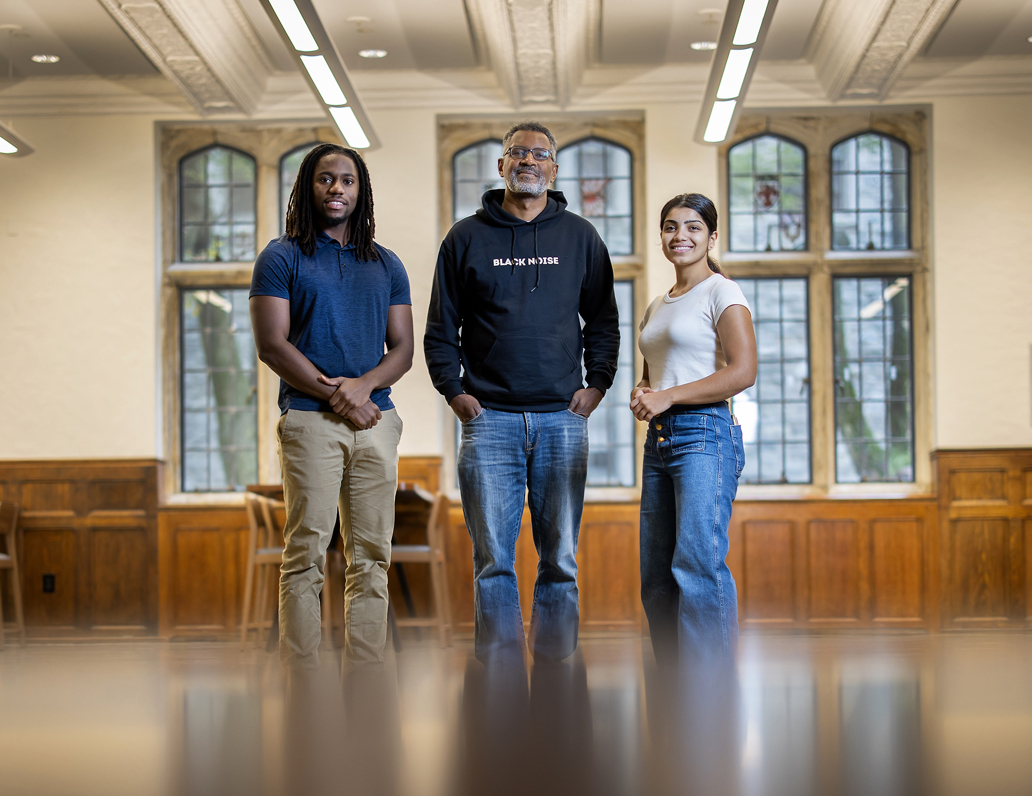Financial security is out of reach for many Americans. For scores of households an inequitable distribution of resources and growing economic instability has pushed them to the financial brink, particularly in the nation’s urban centers.
Inspired to tackle issues of economic inequality and also to empower marginalized young people, The Economic Justice Partnership (TEJP) has, since 2022, hosted financial literacy workshops with middle and high school students around Philadelphia, as well Penn and other college students, specifically targeting those who identify as first generation or lower income.
The initiative, a Projects for Progress winner in 2022, was created by Wharton School undergraduate Khushi Shelat, then-Wharton undergrad Solomon Thomas, and Brian Peterson, director of Makuu: The Black Cultural Center and a Penn lecturer. Shelat is a fourth-year student from Brisbane, Australia, majoring in statistics at Wharton, and Thomas graduated in May with a degree in management and entrepreneurship, also from Wharton.
“Like any other financial literacy program, it’s about where to get started. But it’s unique in that it is also about connecting with these students in terms of what they care about, and what their history is to help them understand the importance of starting,” Shelat says.
Another big difference is that, thanks to the P4P funding, that team is able to award $250 investment stipends to participants after they complete the workshops so they can put what they learned into practice right away.
From the basics of setting up an investment account, to giving a play-by-play on how interest accrues, to the essentials of budgeting, the workshops focus on financial empowerment. They also address the root causes of economic inequality, providing an unvarnished look at policies built on historic and systemic racism.
Peterson has focused on teaching urban financial literacy at Penn for several years, getting started with the popular Life 101 course that he co-teaches with NFL veteran and Penn alumnus Brandon Copeland. In the fall semester, Peterson taught the SNF Paideia class, Inequity and Empowerment: Urban Financial Literacy. He’s familiar with letting students know right away that it is OK to have uncomfortable conversations about race.
“Philadelphia is the poorest large city in America and that’s racially coded, so we have to have specific conversations to talk about how this happened,” he says. “We are also going to instill these baseline ideas that maybe you haven’t thought about in terms of habits and practices around investing and show that, in one sense, that space is democratized. But the wealth space is not, where people have hundreds of years of advantage and others don’t even understand how investing works. So, we create a comfortable, safe space to talk about it.”
The group’s fourth cohort, called TEJP Collegiate, wrapped up on Dec. 1, and included students from Penn, Drexel, Villanova, and La Salle.
This semester, the group also did a partnership session with Blues Babe, Grammy-winning singer Jill Scott’s foundation, and will be working with Philadelphia Youth Basketball starting in January.
Economic justice as equal opportunities
Unveiled in 2020, the Projects for Progress are managed by Penn’s Office of Social Equity & Community, which distributes up to $100,000 each to chosen teams of Penn students, faculty, and staff working to promote equity and inclusion in Philadelphia by addressing topics like health care, education, systemic racism, and environmental justice.
Shelat’s interest in urban financial literacy started as a side project during her gap year, when she created personal finance educational programming while back home in Australia. Coming to Penn, she signed up for Peterson’s Urban Financial Literacy course. “I came to him with some ideas on how I could continue working on something similar to that gap year programming, but here at Penn, and that’s when he, Solomon, and I connected on his specific idea for the Economic Justice Partnership, which aligned a lot with all the things that I’d been thinking about.”
For her, economic justice means an equal opportunity to financial understanding and financial education.
“The way that we also think about it in the context of the Economic Justice Partnership is racially informed financial literacy education,” she says. “Professor Peterson has done a lot of work in terms of making sure people feel comfortable having the real conversations around racism and financial injustice, and I think that’s a really big part of the definition of the partnership in general.”

